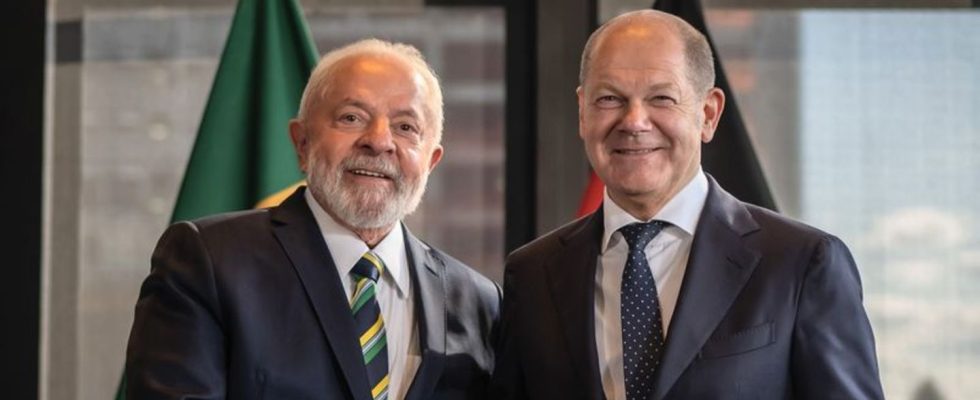diplomacy
President Lula in Berlin: Is the free trade agreement coming?
Brazil’s President Luiz Inácio Lula da Silva (l) and Federal Chancellor Olaf Scholz meet in Berlin. photo
© Michael Kappeler/dpa
Negotiations have been underway for many years to establish one of the world’s largest free trade zones in Europe and South America. The German-Brazilian government consultations could bring a breakthrough closer.
After an eight-year break, the governments of Germany and… Brazil met again for the first time for comprehensive consultations on their cooperation. Under the leadership of Chancellor Olaf Scholz and President Luiz Inácio Lula da Silva, the Berlin Chancellery will today focus on economic cooperation, energy and climate protection as well as foreign and security policy.
The most exciting question: Can the years-long negotiations on a free trade agreement between the South American economic community Mercosur and the European Union finally be brought to a conclusion?
Free trade zone with over 700 million inhabitants
The agreement would create one of the world’s largest free trade zones with more than 700 million inhabitants. The EU’s discussions about this with the four Mercosur states Brazil, Argentina, Uruguay and Paraguay have been going on for well over 20 years. However, a fundamental agreement from 2019 will not be implemented due to ongoing concerns – for example about rainforest protection.
The German economy demands a quick conclusion. However, the Green party conference had recently called for renegotiations against the will of the federal executive board in order to put an end to the “intensive mining of raw materials in the global south for the consumption of the global north”. The government coalition made up of the SPD, Greens and FDP, on the other hand, made it clear in the Bundestag a few days ago that it stood by the planned trade agreement.
Numerous agreements planned
Several ministers on both sides take part in the meeting, nine on the German side. Numerous agreements are to be signed, including on biodiversity and marine protection, the reforestation of rainforests, digitalization and the extraction of mineral raw materials.
Brazil chairs the G20
Brazil took over the chairmanship of the G20 round of leading economic powers on December 1st and will host the summit in Rio de Janeiro next year. But it is also represented in the Brics group with China, Russia and India, which is seen by many as competition to the G7 of western industrialized countries.
In terms of security policy, there are clear differences between Germany and Brazil, including on the Gaza and Ukraine wars. While Germany is only advocating for ceasefires between Israel and the Islamist Hamas in order to enable humanitarian aid, Brazil is calling for an immediate and permanent ceasefire. In the Russian war of aggression against Ukraine, Brazil has long been committed to peace negotiations, while Germany leaves the decision to Ukraine.
Consultation pause because of Bolsonaro
The Federal Government regularly arranges government consultations with countries with which there is a particularly close partnership or which are of particularly great strategic importance for Germany. The cabinets of Germany and Brazil met for the first time in Brasília in 2015 to broaden their relations.
However, under right-wing populist President Jair Bolsonaro, who earned the nickname “Tropical Trump,” the consultations were on hold for years. After Lula’s return to the Brazilian leadership, the idea was revived. In January, Lula and Scholz agreed to resume consultations during his inaugural visit to Brasilia.

